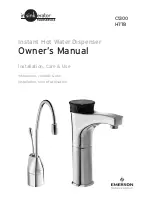
Page 7-64
MDE-4334C Atlas Start-up and Service Manual · April 2008
Hydraulic/Mechanical Components
Pump Motor
Belts and Pulleys
Inspecting Pulleys and Belts
Check pulleys and belts every time you inspect or change belts. Replace them if any of these
conditions exist:
• Excessive wear in the pulley grooves, on the pulleys, belts, excessive pulley-to-shaft
clearance, or excessive bearing play
• Cracks or linear separations in the belt
• Frayed belts or excessively worn belts
Service Tips
• Excessive belt tension can cause motors or the pumping unit to fail prematurely.
• Excessively low belt tension can cause premature belt failure, noise or pulley failure as
well as reduced flow rate.
Belts and pulleys can pinch fingers and hands.
Injuries may result. Avoid placing fingers or hands between
belts and pulley.
Never apply power while fitting the belt to the pulley.
WARNING
Setting the Belt Tension
Overtightened belt tension can cause both pump and motor bearing to excessively wear out
and lead to premature failures. Loose belts result in low flow, pulley and belt failures, or noise.
Use the following rating of belt tension: 45-55 lbs (200-244 newtons).
Do not run the motor to install the belt. The belt is tight during assembly. Some belts have
arrows marked on them to show the direction of rotation. While replacing belts, ensure that the
arrows point in the direction of rotation.
















































